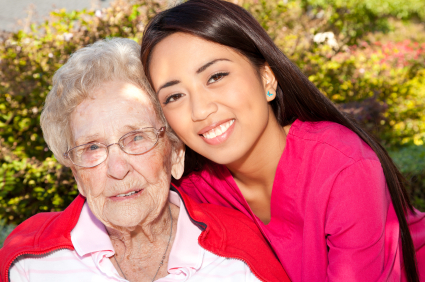Home Care Blog
Caring for an Alzheimer’s Patient
 MAS Home Care, with branches in Maine, New Hampshire and Rhode Island specializes in home care services for patients who have fallen victim to Alzheimer’s disease.
MAS Home Care, with branches in Maine, New Hampshire and Rhode Island specializes in home care services for patients who have fallen victim to Alzheimer’s disease.
What is Alzheimer’s disease? It is a degenerative brain disorder that destroys the neurons in the brain, and robs the victim of their intellectual capabilities, memory, reasoning, and ultimately takes away the victim’s ability to socialize verbally or physically.
Caring for an Alzheimer’s patient can be a lot like going over a slippery slope. The caregiver must be constantly vigilant to make sure the patient is safe, occupied, comfortable and secure. For patients who are in a late stage of Alzheimer’s, it is almost like watching a small child, in that the patient can get into things they shouldn’t have access to. For instance, leaving medications within reach can be a prescription for disaster. The patient may see them as candy and decide to try a handful of them. If it’s a beautiful day outside and you decide to take the patient out for some fresh air or to stretch their legs a bit (provided they are still mobile), it is vital that the caregiver walk closely beside them. They may still be mobile but their footing might not be as good as it was when they were healthier. The other reason to keep them close by you is so they don’t wander off in some other direction and get lost.
In the earlier stages of Alzheimer’s, when the patient is still fairly cognizant, the caregiver might want to place little post-its where things are located such as “forks” by the fork drawer, “glasses” by the glass cabinet, “soda” posted on the refrigerator. It makes it less confusing and less embarrassing for the patient who is still cognizant enough to feel uncomfortable and embarrassed by their lack of memory.
The more Alzheimer’s disease progresses, the less the patient is able to communicate rationally and the more actual reality escapes them. In the mid to later stages, it’s not uncommon for them to babble on, trying to express things that make absolutely no sense. Caregivers often wonder if they should try to correct what they’re saying or complete their sentences for them; doing this can actually make things more uncomfortable all around. It’s best to try and enter the patient’s mental and emotional world, if you can. In other words, whatever fragments of sentences come out of their mouths you can treat as normal. “Oh look, the sky just turned pink” says the patient. “And a pretty shade of pink it is, too” says the caregiver. Entering the patient’s world is important in so many ways. At a certain point, the patient may begin to become stubborn; for instance, the caregiver may be trying to get them dressed and they may fight it every step of the way. They may spit out pills that are given to them. It’s so important to understand that the patient is trying desperately to hold onto any remaining shreds of independence they possibly can. Although being a caregiver is challenging, the sense of accomplishment, gratification and peace you bring to the lives of families in need far exceeds all of the challenges.
Looking for home care services for a loved one? Contact MAS Home Care today for Maine home care, New Hampshire home care, or Rhode Island home care.


